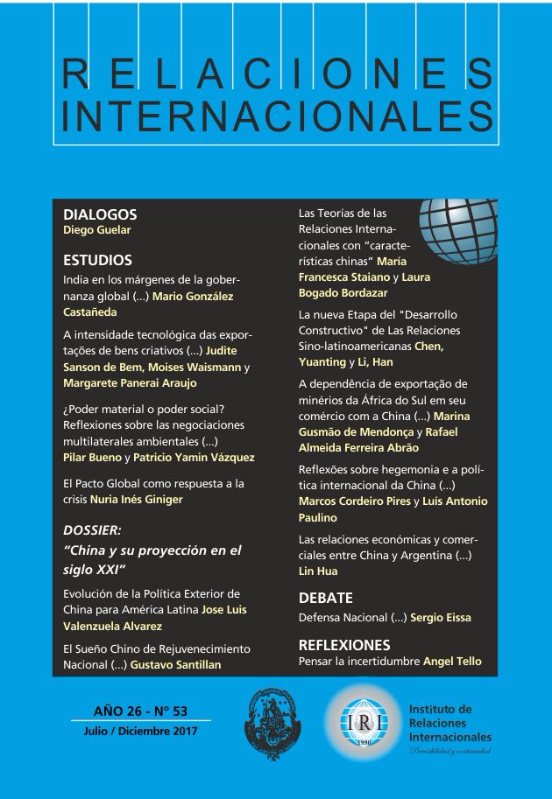Reflections upon China’s hegemony and international policy: the “Belt and Road” initiative as a pacific development strategy
DOI:
https://doi.org/10.24215/23142766e019Abstract
The "Belt and Road" Initiative, proposed by China in 2013, is an audacious economic and geopolitical project aimed at expanding and strengthening regional cooperation in the Eurasian context and in the Pacific and Indian Ocean basins. The project has two axes: land and sea, respectively the Economic Belt of the Silk Road and the Maritime Silk Road in the 21st century. This Initiative provides an opportunity to analyze the context of China's foreign policy and the strategies established to achieve its long-term goals such as its "peaceful development", the creation of a multipolar world order and the reaffirmation of "Five Principles of Peaceful Coexistence ", means with which it seeks to build a new model of relationship between great powers that helps overcome a supposed inevitability of the "Thucydides Trap". For this, this article is divided in three sections, besides the introduction and the concluding remarks. In the first section, we will seek to raise some ground on the historical foundations of China's current foreign policy formulation. In the second section, we will discuss the evolution of Chinese foreign policy by analyzing the documents and statements of its leaders since 1978, when the "Reform and Openness" process begins. Finally, we will look at the Belt and Road Initiative as an example of how in practice China seeks to create the means to reaffirm its pacifist and inclusive intentions in a rather troubled geopolitical context.
Keywords: China; hegemony; Thucydides’ Trap; Belt and Road Initiative
Downloads
Downloads
Published
How to Cite
Issue
Section
License
Aquellos autores/as que tengan publicaciones con esta revista, aceptan los términos siguientes:
- Los autores/as conservarán sus derechos de autor y garantizarán a la revista el derecho de primera publicación de su obra. A partir de noviembre del 2020 los artículos se publicarán en la revista bajo una licencia Creative Commons Atribución- NoComercial-CompartirIgual 4.0 Internacional (CC BY-NC-SA 4.0). Acorde a estos términos, el material se puede compartir (copiar y redistribuir en cualquier medio o formato) y adaptar (remezclar, transformar y crear a partir del material otra obra), siempre que a) se cite la autoría y la fuente original de su publicación (revista y URL de la obra), b) no se use para fines comerciales y c) se mantengan los mismos términos de la licencia.
Previo a esta fecha los artículos se publicaron en la revista bajo una Licencia de reconocimiento de Creative Commons (BY-SA 2.5). - Los autores/as podrán adoptar otros acuerdos de licencia no exclusiva de distribución de la versión de la obra publicada (p. ej.: depositarla en un archivo telemático institucional o publicarla en un volumen monográfico) siempre que se indique la publicación inicial en esta revista.
- Se permite y recomienda a los autores/as difundir su obra a través de Internet (p. ej.: en archivos telemáticos institucionales o en su página web) antes y durante el proceso de envío, lo cual puede producir intercambios interesantes y aumentar las citas de la obra publicada. (Véase El efecto del acceso abierto).

























